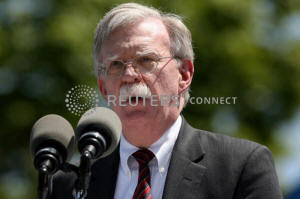|
Bolton says Iranian naval mines likely
used in UAE tankers attacks
 Send a link to a friend
Send a link to a friend
 [May 29, 2019]
By Lisa Barrington [May 29, 2019]
By Lisa Barrington
ABU DHABI (Reuters) - U.S. National
Security Adviser John Bolton said on Wednesday that naval mines "almost
certainly from Iran" were used to attack oil tankers off the coast of
the United Arab Emirates this month and warned Tehran against new
operations.
Bolton said the "prudent and responsible" approach taken by the United
States, which has beefed up its military presence in the region, had
made it clear to Iran and its proxies that such actions risked a "very
strong" U.S. response.
He was speaking to reporters in Abu Dhabi ahead of emergency summits of
Arab leaders in Saudi Arabia on Thursday called to discuss the
implications of the tanker attacks and drone strikes two days later on
oil pumping stations in the kingdom.
The UAE has not yet blamed anyone for the sabotage of four vessels,
including two Saudi tankers, near Fujairah emirate, a major bunkering
hub just outside the Strait of Hormuz.
Riyadh has accused Tehran of ordering the drone strikes, which were
claimed by the Iran-aligned Houthis who have been battling a Saudi-led
coalition in Yemen in a four-year conflict seen as a proxy war between
Saudi Arabia and Iran.

Iran has denied involvement in either attack.
"I think it is clear these (tanker attacks) were naval mines almost
certainly from Iran," Bolton said. "There is no doubt in anybody's mind
in Washington who is responsible for this and I think it's important
that the leadership in Iran know that we know."
There was no immediate response from Iran to the comments by Bolton, who
did not provide evidence to support his statement.
The U.S. official declined to comment on the specifics of an
investigation into the attacks in which the United States, France,
Norway and Saudi Arabia are taking part, but said the countries and ship
owners involved could do so.
MOUNTING TENSIONS
A UAE bunker barge and a Norwegian-registered oil products tanker were
also hit. France has a naval base in Abu Dhabi.
Bolton said the tanker attacks were connected to the strike on oil
pumping stations on the kingdom's East-West pipeline and a rocket attack
on the Green Zone in the Iraqi capital Baghdad.
He said there had been a fourth unsuccessful attack on Saudi Arabia's
Yanbu port a few days before the tanker operation but that it was
unclear if it was linked to the others. Saudi officials were not
immediately available to comment.
Tensions between the United States and Iran have escalated since
President Donald Trump withdrew from a 2015 multinational nuclear pact
with Iran and reimposed sanctions, notably targeting Tehran's key oil
exports. Iran says it will not be cowed by what it has called
psychological warfare.
[to top of second column]
|

U.S. National Security Advisor John Bolton speaks during a
graduation ceremony at the U.S. Coast Guard Academy in New London,
Connecticut, U.S., May 22, 2019. REUTERS/Michelle McLoughlin/File
Photo

Iranian President Hassan Rouhani signaled on Wednesday that talks
with the United States might be possible if Washington lifted
sanctions and met its commitments under the nuclear deal, state
television said.
Sunni Muslim allies Saudi Arabia and the UAE have backed sanctions
against Shi’ite Iran, a fellow OPEC producer but a regional foe, and
have lobbied Washington to contain Tehran.
Bolton said the United States was trying to be "prudent and
responsible" in its approach and was discussing next steps with Gulf
allies.
"I support what we are doing so far. The point is to make it clear
to Iran and its surrogates that these kind of activities risk a very
strong response from the Americans."
SHOW OF FORCE
Washington said it was sending 1,500 troops to the region after
speeding up deployment of an aircraft carrier strike group and
sending bombers and additional Patriot missiles.
Bolton said the United States was bringing in engineering
capabilities "to help harden facilities associated with U.S. and
partner military bases". He voiced concern about perceived threats
from the overseas arm of Iran's Revolutionary Guards.
"We are very concerned about the Quds Force and Qassem Soleimani
using Shi'ite militia groups and others in Iraq as indirect ways to
attack our embassy in Baghdad, consulate in Erbil, our various bases
around the country," he said.

The U.S. Combined Air Operations Center is based in Qatar and its
navy Fifth Fleet in Bahrain. The U.S. air force also uses al-Dhafra
airbase in Abu Dhabi.
Iran's Deputy Foreign Minister Abbas Araqchi visited Oman, Kuwait
and Qatar this week. He said on Tuesday that Tehran was ready to
engage in dialogue with Gulf countries.
(Additional reporting Asma Alsharif and Dubai newsroom; Writing by
Ghaida Ghantous; Editing by Jon Boyle)
[© 2019 Thomson Reuters. All rights
reserved.]
Copyright 2019 Reuters. All rights reserved. This material may not be published,
broadcast, rewritten or redistributed.
Thompson Reuters is solely responsible for this content. |